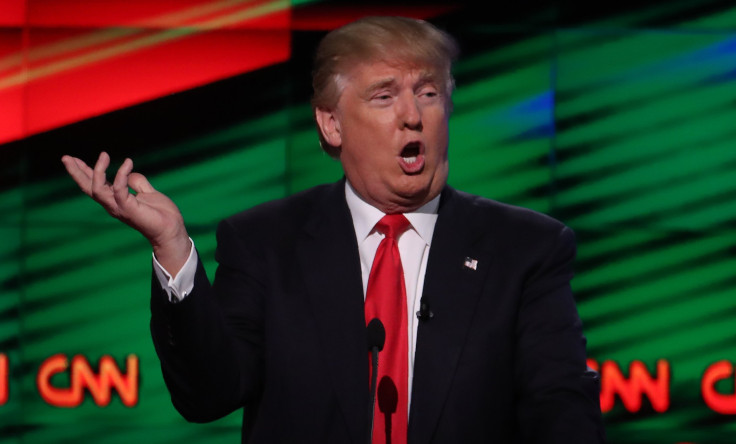Donald Trump And Republican Mega-Donors Get Flirty: Will Billionaires Back One Of Their Own For 2016?

Donald Trump has often boasted that he is not beholden to large donors because he has self-financed his presidential campaign (a claim that Politifact rates as "half true"). But during Thursday night's GOP presidential CNN debate, the front-runner explicitly left open the possibility that he would accept large donations in the general election if he becomes the nominee. His remarks hinted at a thaw in his often contentious relation with top conservative donors.
"I will make a decision on that, but I have not made that decision yet," said billionaire businessman Trump. "My decision was I will go through the entire primary season [with a largely self-financed campaign]."
Many top Republican fundraisers have openly rejected their party's front-runner. A leading anti-Trump super PAC, Our Principles PAC, has spent more than $9 million in this election cycle thus far, according to an analysis of federal filings by OpenSecrets.
Trump, for his part, has delighted in tweaking major conservative donors, such as the Koch brothers. As recently as last week, he mocked them on Twitter for backing "the lightweight from Florida," Sen. Marco Rubio.
While I hear the Koch brothers are in big financial trouble (oil), word is they have chosen little Marco Rubio, the lightweight from Florida
— Donald J. Trump (@realDonaldTrump) February 28, 2016
But as the likelihood that another Republican can defeat Trump has faded, both the prospective nominee and his potential donors have inched toward a détente. Hours before Trump took to the debate stage on Thursday, Politico reported that some prominent Republican contributors — including hedge fund billionaire T. Boone Pickens and pro-Cruz super PAC funder Toby Neugebauer — say they would support him in a general election fight against Hillary Clinton.
One week prior, a spokesman for the Koch brothers' political operation confirmed they would not spend against Trump in the primary.
Accepting major donations in the general election makes sense for Trump, whose campaign has spent about $25 million so far. Mitt Romney's 2012 presidential campaign cost more than $400 million, and the price tag is trending upward with each new cycle. That doesn't even include super PAC spending, which amounted to hundreds of millions more on both sides of the 2012 race.
Whether Trump would continue to disavow super PAC spending on his behalf in the general election remains to be seen. During Thursday's debate, he said, and not for the first time, that super PACs are "a disaster ... very corrupt."
© Copyright IBTimes 2024. All rights reserved.






















